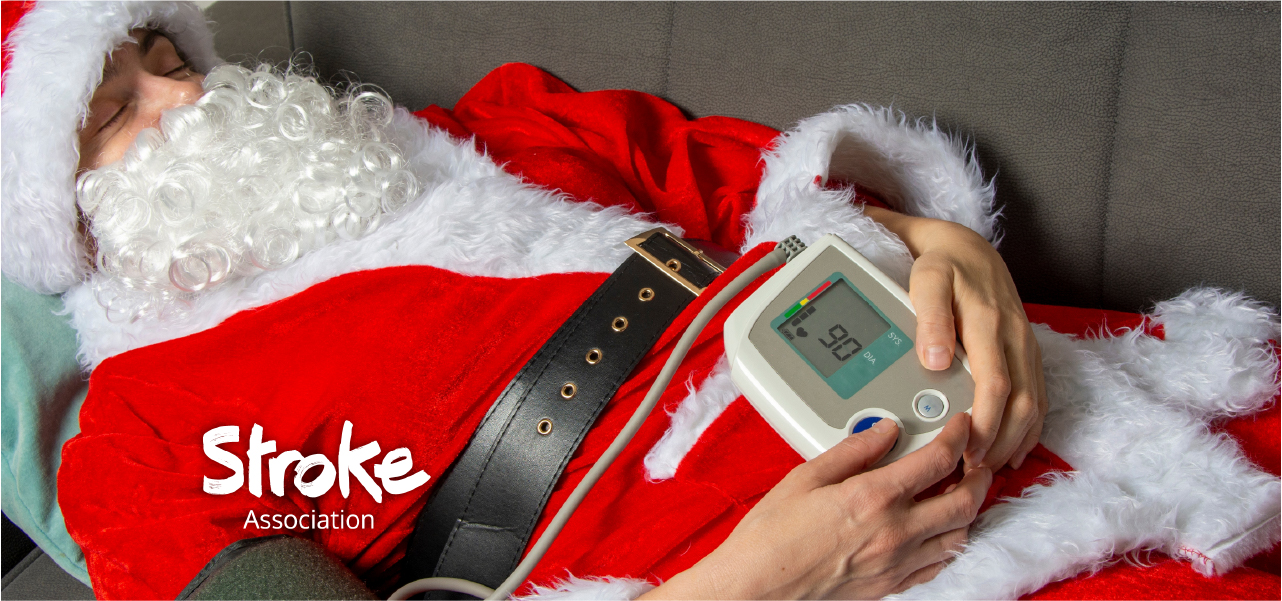09 December 2024

How to stay healthy and reduce your stroke risk over Christmas
While it may be difficult to stay healthy over Christmas our tips for eating well and being active can help reduce your risk of stroke at this indulgent time.
You can reduce your risk of stroke by making healthy choices any time of the year, including eating well, being physically active, managing your stress, limiting alcohol and being smoke free. But of course, that can be especially difficult during the Christmas period.
As the festive season approaches, we’re more likely to indulge in treats and eat out more than we do during the rest of the year. This Christmas, the Stroke Association has some tips on how to eat, drink and be merry, while still staying healthy over Christmas.
Eat a filling breakfast
Start your day with a hearty breakfast instead of leftovers or chocolates. Why not try some scrambled eggs with avocado and smoked salmon, frozen berries added to porridge with cinnamon, or pancakes topped with fresh fruit and yoghurt, for a filling but nutritious way to start the day.
Add fruits and vegetables to your Christmas dinner and meals
Include fruits and vegetables in every meal. Low in calories and containing vitamins, minerals, and fibre, adding a portion of fruit and vegetables to your daily diet can reduce your risk of stroke by up to 10%. Every extra portion you eat reduces your risk even further. From brussels sprouts to red cabbage and roast parsnips, there are lots of trimmings for your Christmas dinner that help you pack in your five a day. Try also replacing some of the crisps and chocolate with healthy snacks, for example, a piece of fruit or raw carrot sticks with hummus.
Choose wholegrain options
Including whole grains in your diet can help to prevent type 2 diabetes, heart disease and weight gain. Wholegrains are a good source of B-vitamins and folic acid, as well as both types of fibre (soluble and insoluble). Look for wholegrain breakfast cereals, choose wholegrain bread, and try bread made with rye and other grains. Oats can help lower cholesterol, and oat bran, rye and barley all help too.
Use herbs and spices
Eating high levels of sodium, the main ingredient in table salt, leads to high blood pressure and increases the likelihood of stroke. Add flavour to your meals with herbs and spices instead of salt. Herbs and spices are a guaranteed way to create the flavours that we love and associate with the festive season. From rosemary to cinnamon, these delicious flavours can infuse and enhance your dishes this Christmas without reaching for the salt. However, if you find yourself wanting to season your Christmas Day roasties with salt, then you can also swap out regular salt with LoSalt®*, which contains 66% less sodium and can be used the exact same way, whether cooking, baking or seasoning.
Drink water and limit alcohol
Staying hydrated and drinking plenty of water can help prevent overeating and reduce the negative effects of drinking alcohol. Many people enjoy a drink as part of a social occasion or a meal over the festive season, and alcohol is often used as part of Christmas celebrations. But drinking above the recommended limits for alcohol can increase your risk of stroke, and it can also affect your recovery and wellbeing. It’s important to stay within the guidelines of 14 units a week for men and women. Try alternatives to alcohol and experiment with flavours. Add slices of fruit to bring extra zing to soft drinks, or try non-alcoholic versions of your usual drinks such as alcohol-free wines and beers. Go for smaller sizes such as a bottle of beer instead of a pint, or a smaller glass of wine. Keep a range of non-alcoholic drinks that you like at home, or you could serve drinks that are lower in alcohol, like spritzers or fruit punches.
Stay active
Being physically active can help reduce your risk of a stroke. Moving around more can also help your emotional wellbeing by releasing chemicals into your brain that make you feel better. For some people, this could mean walking around the room, and for others it may mean enjoying a long winter walk outside with friends or family. This festive season, get outdoors for some exercise if you are able or play games indoors if the weather isn’t good. Speak to your GP or therapist first if you’ve not exercised for some time or have any concerns.
Finally, remember Christmas is a special time of year, so it is important to be realistic about food choices and enjoy yourself. If you feel you have overindulged, don’t beat yourself up – focus on making positive changes in the future. Have a happy, healthy festive season!
